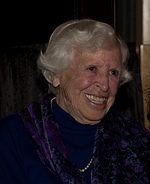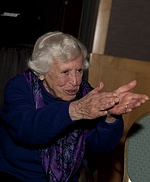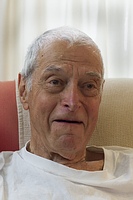The Journey to Ninety-Something: How To Live To Tell The Tale
In Palisades, a number of nonegenarians are greeting advanced age with verve and good humor, and in their individual ways providing living proof of the power of engagement. Dorothy Davis, 96, and Albon Man, 94, one who writes stories and the other who tells them, both with deep roots and rich histories in our community, agreed to share with me the view from ahead.
Dorothy Salisbury Davis had to make a tough decision. A renowned writer of mystery novels, a Grandmaster of the Mystery Writers of America, and nominated seven times for the Edgar award, accustomed to success and a certain independence, she found it increasingly difficult to carry on alone. How do people come around to their decisions if not thrust upon them? she asks. Her house suffered many aches and pains, was somewhat decrepit— more so than she, she adds laughing. The squirrels were emboldened and chipmunks moved in. When the winds blew, the trees creaked ominously. And then there was her study and her thousands of books, the mementos of a long and fruitful life. With the help of Laurie Ferguson, former pastor of the Palisades Presbyterian Church, who researched various options for her, she settled on a plan that allowed her to stay in the community.
I met with her one afternoon in her new home in the Esplanade.
“Coming here was the remotest of all the possibilities I had to choose from,” she said. “I surprised myself more than anyone.” The decision was clear when she first saw the room and was struck by the view out the window, much like the one from her old study, an extension of her interior life. A rolling lawn fringed with woods, frequented by deer, skunk, squirrels, and a variety of birds, but only the occasional human. Here she knew she could have solitude.
She has surrounded herself with the objects she most values, mostly acquired at auction at Yonder Hill. For example, on her wall is an etching of sheep traveling up a steep, narrow path into the horizon. She calls it Journey That Goes On Without End. She and her friend Christianna Brand, the British crime writer, were attending one such auction and when the picture of the sheep came up, Dorothy bid on it, but to her great disappointment, lost. At the end of the auction, Christianna presented the picture to her as a gift, at which point they discovered in a twist worthy of O’Henry they’d been bidding against each other. The sewing table at her bedside, given to her by Peter Grey, once belonged to his mother, Marian Grey, Dorothy’s friend and neighbor and a leading expert on laces. Each piece elicits stories from her life.
It was not devastating to leave the house, she said. It had already been emptied to allow for repairs, and she found she didn’t mind. Dorothy describes herself as gregarious and her social life is vibrant. She reads a great deal, keeping up with current literature, and offers that she is “slightly annoyed” with the critics’ quibbling over flaws in the recently reviewed Revelations.
As for her own books, she has brought few with her. “It’s all so changed,” she observes. “Who needs a reference library now when you have the internet?” She continues to write in long-hand, “but not with a quill,” working, albeit slowly, on her memoirs with her friend, the writer Joanne Bentley. She considers herself quite happy now—only ever bored if she can’t get out, but then she has her view.
Now to Albon Man, who began our conversation by pointedly remarking that membership in the Palis-Agers Club is highly restrictive; with a minimum age requirement of seventy-five, most need not apply.* To those who might be interested in eventually joining that august group, he strenuously offers the following advice. Get out! Keep busy! I accompanied him on his daily walk one recent morning when the weather was fine. We ambled slowly along the side of Closter Road where he lives. There was almost no traffic so we could stop frequently on the pavement and take notice of our surroundings. He showed me his favorite resting spot, a saddleshaped capstone on the wall lining the road. From here he watches people passing by and waves to all whether he knows them or not. While he was demonstrating, a pick-up truck came around the curve and the driver leaned out his window to yell, “Hi, Albon!” “See?” Albon said. “It’s all very friendly.”
But do not think he is a stonewall potato. When he is not out walking, he travels to the city for concerts at Carnegie Hall, to observe master classes with the world’s great musicians at the Manhattan School of Music, and to lunch with friends in mid-town. Like Dorothy Davis, he reads a great deal and stays current with world events.
In his first retirement at age 65 from Prentice Hall where he oversaw the publication of legal and tax-related materials, rather than sit at home, he began a new career with the American Institute of Certified Public Accountants. He retired for the second time at age 80. Even then he could not sit, but volunteered with the Historical Society of Rockland and, a lifelong pacifist once imprisoned for refusing induction into the military during WWII, he joined the peace vigil on Rte. 59 in Nanuet. Now he’s not able to do all that he could before and frets over the state of repair of the library fence, which in earlier times he would have fixed himself. But in the end, he says, his eyes misting over, his family and his friends are really what keep him going. That could be said of all of us, really, at any age.
For more information on thePalis-Agers, see their announcement on page 20.




